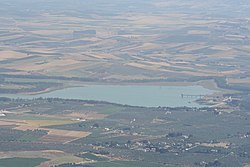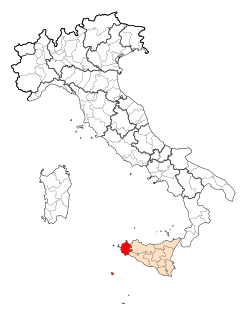Trapani Province
| Province of Trapani | |
|---|---|
| Province | |

Lago di Paceco
|
|
 Map highlighting the location of the province of Trapani in Italy |
|
| Country |
|
| Region | Sicily |
| Capital(s) | Trapani |
| Comuni | 24 |
| Area | |
| • Total | 2,460 km2 (950 sq mi) |
| Population (2013) | |
| • Total | 436,150 |
| • Density | 180/km2 (460/sq mi) |
| Time zone | CET (UTC+1) |
| • Summer (DST) | CEST (UTC+2) |
| Postal code | 91100 |
| Telephone prefix | 0923 |
| Vehicle registration | TP |
| ISTAT | 081 |
Trapani (Italian: Provincia di Trapani, Sicilian: Pruvincia di Tràpani) is a province in the autonomous island region of Sicily in Italy. Its capital is the city of Trapani. It has an area of 2,460 square kilometres (950 sq mi) and a total population of 436,150 (2013). There are 24 comunes (Italian: comuni) in the province (see Comuni of the Province of Trapani).
Besides the capital Trapani, other cities and places of interest in the province include Segesta, Gibellina, Erice, Castelvetrano, Alcamo, Marsala, Mazara del Vallo, Castellammare del Golfo, and Mozia. The nearby island of Pantelleria, noted for its wine production, and the Aegadian Islands are also administratively a part of Trapani province. The Province of Trapani is a major centre for viticulture.
The area now covered by the province was occupied successively by the Carthaginians, Greeks and latterly by the Romans. The port of Trapani, first known as Drepana, then Drepanon, was inhabited by the Sicani and the Elymi becoming a prosperous Phoenician trading centre by the 8th century B.C. It was taken by the Carthaginians in 260 B.C. and by the Romans in 240 B.C., becoming a civitas romana until 440 A.D. when it was sacked by the Vandals, then by the Byzantines and ultimately by the Muslims in 830. In the 16th century, it received privileges under Emperor Charles V of Spain who also strengthened the town walls. Trapani became the provincial capital in 1817.
...
Wikipedia
